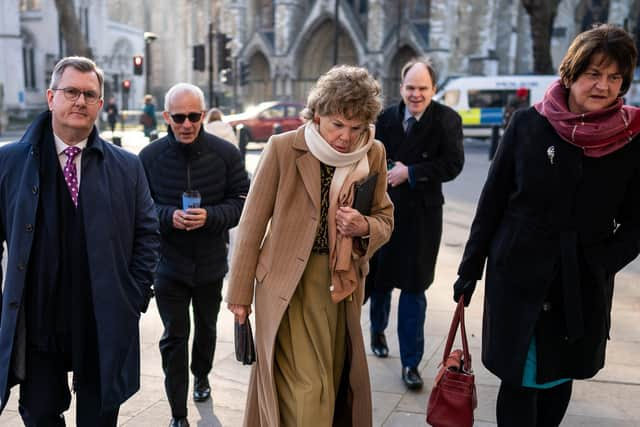Northern Ireland Protocol and the Good Friday Agreement: 'The Union is not as safe as we were told in 1998' say leading unionists - including from UUP, DUP, and TUV
and live on Freeview channel 276
The comments appear in a piece written for the News Letter jointly by Jim Allister, Steve Aiken, Baroness Foster, Ben Habib, Baroness Hoey, and Sir Jeffrey Donaldson.
You can read it at the link at the bottom of the page.
It comes after the court ruling brought a two-year-long court case challenging the legality of the protocol to an end.
Advertisement
Hide AdAdvertisement
Hide AdIn rejecting the challenge, the judges nonetheless found that a key part of the Acts of Union had been “in effect suspended” thanks to the protocol.
It also found that The Northern Ireland Act, which gave effect to the 1998 Good Friday deal, only regulates one specific aspect of the Province’s constitutional status – namely, whether it formally remains within the UK, or becomes part of a united Ireland.
In their article in the News Letter, the unionist group said: “The adjudication by the Supreme Court yesterday confirmed unequivocally our fears of the damage done by the protocol …
“Cross-community consent is a cornerstone of the Belfast Agreement.
Advertisement
Hide AdAdvertisement
Hide Ad

“That a major constitutional change could be imposed on Northern Ireland without that consent is not only instructive of government’s attitude to the integrity of the country and its pledges to the British people.”
The case shows “the principle of consent is not the safeguard unionism was promised in 1998”.
Lord Bew also writes for the News Letter today, saying that while the constitutional position of NI is unchanged, but that the protocol must be made to compatible with the Belfast Agreement “in all its parts”.
A government spokesperson told this newspaper last night: “We welcome that the Supreme Court has reaffirmed the sovereignty of Parliament in approving and legislating for the agreement negotiated in 2019.
Advertisement
Hide AdAdvertisement
Hide Ad"However, this does not change our determination to address the real problems the protocol is causing ... Intensive talks with the EU continue to that end.”